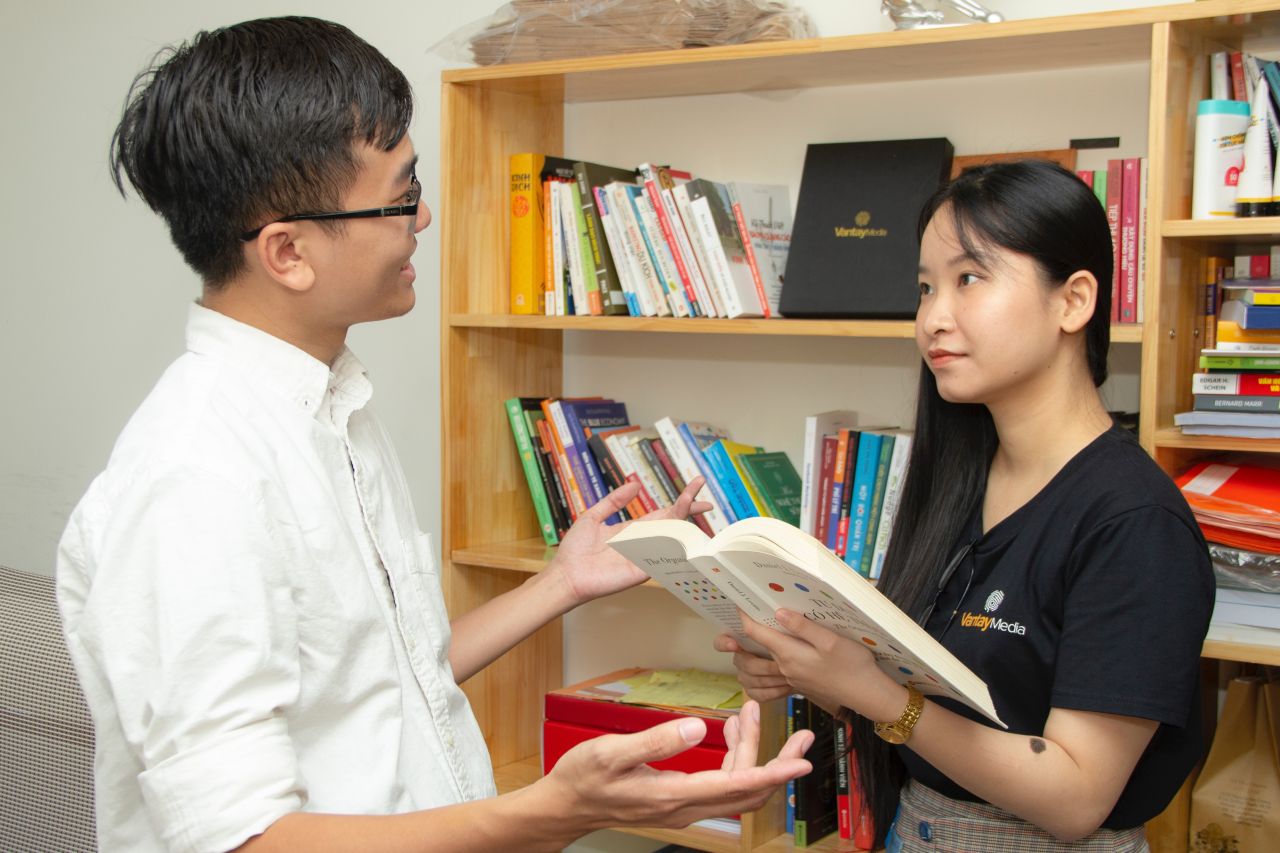Are you thinking about learning a new language? There are so many benefits to doing so! Not only will you be able to communicate with more people, but you'll also be able to understand other cultures better. Plus, it's a great way to keep your brain sharp. So how do you go about learning a new language? Check out these tips!
Way To Learn A New Language In Simple Steps
Set Language-Learning Goals.
The first step to learning a new language fast is to set goals for what you want to achieve. When you think about it, this makes a lot of sense. But, if you don't set goals, how can you know what you want to achieve and measure whether you have achieved it?
When faced with the idea of learning a new language, most of us feel overwhelmed. So there are many words to learn and so many different ways to study. Setting goals narrow your focus so you can stop worrying about the details and get down to business.
Research shows that people who set the right goals are more likely to succeed.
Use these guidelines to get the most from your goals:
- Focus on specific, tangible outcomes. Set clear goals, and focus on what you plan to learn rather than how much time you plan to study. An example of a good goal might be, "This week, I'm going to learn 30 Spanish vocabulary words related to shopping."
- Set short-term goals. It's good to have an ultimate goal—the thing you eventually hope to achieve. But long-term goals are too overwhelming to motivate you on an everyday basis. Break down your ultimate goal into smaller bits, and set smaller goals for each week or month.
- Challenge yourself (but not too much). Goals work best when they make you push yourself. But if they're too daunting, they can discourage you. A good way to get around this is to set goals with various outcomes. For example, you might say, "I want to learn 30-50 new vocabulary words this week." The lower number in this range helps you feel the goal is achievable, while the higher number allows you to push yourself.
- Write down your goals. Writing down goals helps you commit to them. Post your goals in a prominent place, like your bathroom mirror or the home screen of your smartphone.
Learn The "Right" Words.
Languages are made up of a shocking number of words. English, for example, has between 600,000 and 1 million words.
Luckily, you don't need to learn anywhere near that many words to be proficient in a language. Consider this: the top 100 words make up about 50 per cent of English language texts, and the top 1,000 words make up about 90 per cent!
Check out these lists of the top 1,000 words in these languages:
- Spanish
- French
- German
- Japanese
By focusing on learning these words first, you can eliminate wasted time and quickly increase your understanding.
Study Smart.
You'll learn faster by using the very best study techniques when learning your words.
For example, one of the best ways to learn vocabulary words is to use flashcards. Flashcards help you focus on individual words and test yourself, which helps you memorise new information.
When you learn with flashcards, follow these tips to learn fast:
- Try out electronic flashcards. Paper flashcards work just as well as they ever did, but electronic flashcard programs like Anki provide some great benefits. Using electronic flashcards lets you easily carry large stacks on your smartphone or tablet, and you can take advantage of flashcards that other people have created and made public. These programs also automatically change the order of cards and use spaced repetition to increase the time between repetitions of a flashcard gradually. Both of these techniques help you learn faster and better.
- To maximise your use of SRS programs and electronic flashcards, check out the polyglot Olly Richards' Conversations course, which is designed to help you set up workable, step-by-step systems for learning your target language. You can also get more targeted help with the Uncovered courses, which introduces the basics of specific languages, including Spanish, French, German and Italian.
- Make sure to guess the meaning of a word before turning over the card. Flashcards work best when you use them to test your memory, so don't be too quick to flip the cards over. Even if you don't know a word, make a guess.
- Learn the translations first, then learn to produce the new words. It's easier to learn the translation of a foreign word than to say the foreign word when you see its English equivalent. Start by looking at the side of the flashcard with a foreign word on it, and memorise what the English translation is. Later, turn the cards over and use them to practice producing the foreign words when you see their English equivalents.
- Practice makes perfect, but effective practice makes perfect even faster!
Some more great strategies for integrating new words alongside and beyond flashcards include:
- Visualise and vocalise. Visualise the word you're learning, imagine what it represents and say the new word aloud. It helps you connect the concepts and can improve memorisation.
- Gesture. The brain learns better when you use physical actions while learning. Take advantage of this by gesturing. If you want to learn the German word Schuh (shoe), say the word while pretending to put on a shoe.
- Use the word in your native language. It can be hard to practice words in context when learning a new language because you haven't mastered enough vocabulary to make complex sentences. To get around this, use the word in your native language. For example, if you're learning the Spanish word casa (house), you could say, "I'm going to go to my casa now."
- Keyword technique. Make up a sentence with the new word you're learning, the word's meaning, and a word in your native language that sounds similar. For example, if you want to learn the Spanish word mesa (table), you could think of an English word that sounds similar and make up a sentence like, "My kitchen table is always a mess!" Since "mess" and mesa are very similar, this can help you remember the new word.
Start Using The Language All Day, Every Day.
As a beginner, it can seem overwhelming to try to use the language all day, but it's not as difficult as it seems. There are many easy and even fun ways to make the language a part of your regular life.
First, make use of every moment you have to learn new words. Take flashcards with you, and study them during your train or bus commute (but not while driving, please!) or when you're waiting to meet a friend.
When you start to feel tired, switch from active learning to passive learning by doing what you would normally do in your native language in your target language. For example, try watching a video or TV show or streaming radio broadcasts in your target language.
You may be asking, "How can I possibly watch a video or listen to the radio when I only know a handful of words?"
The goal when you start is not to understand everything you hear but to familiarise yourself with the sounds of the language. Even if you don't understand much of what you hear, simply listening can have many positive effects, including:
- Becoming accustomed to the cadence of the language.
- Learning to identify and understand common words.
- Learning to understand using only context and a few cognates.
- Staying motivated!
Seek Out Real-Life Practice.
Some of the best learning happens in real-life situations, particularly when you have no choice but to use a foreign language.
The easiest way to gain real-life practice is to travel or study abroad. Going abroad creates opportunities to be surrounded by people who speak the language you want to learn, many of whom don't know your native language.
It is the favourite approach of organisations like the Peace Corps, which regularly places people with little or no language knowledge into full immersion situations. Although such situations can be uncomfortable, they provide enormous motivation to learn quickly.
But even without travelling abroad, you can immerse yourself in real-life situations that give you loads of language practice. Try these options:
- Meet with a language partner weekly or biweekly. You might pay your language partner for their time or offer to exchange one hour of practice in the language you want to learn for an hour of practice speaking English.
- Join a conversation club. Many cities and schools have conversation clubs where language students meet regularly to practice having informal discussions in their target language.
- Use an online tutoring or language partner site. Sites such as Coeffee.com or My Language Exchange can introduce you to people who speak the language you want to practice. Even if you don't see them in person, you can gain real-life language practice by chatting online.
- Volunteer with immigrants in your city. Find volunteer opportunities on a site like VolunteerMatch or Idealist, or directly contact organisations that serve immigrants who speak the language you want to learn.
- Visit businesses where people speak your target language primarily. Perhaps there's a Mexican restaurant nearby where you can enjoy delicious food and practice your Spanish with the waiters or owners, or perhaps you can practise your Chinese at a grocery store that sells food to the local Chinese community.
Learn About The Culture.
Understanding a language is about more than understanding words on a page. It's important to learn about the culture and history associated with these words.
Knowing something about a country or culture's history, current events, religious beliefs and common customs can help you understand a lot about what people say and do.
Researchers have found that children learn to read in a second language better when they understand the culture and context behind their books.
As you begin to study a new language, take some time to learn about the culture of the people who speak that language. Don't feel this is a waste of time, even if it involves reading and watching videos in your native language. It will help you enormously and prevent you from making embarrassing and potentially offensive mistakes.
Have Fun!
We learn best when enjoying ourselves, so don't forget to make learning fun.
Playing games is a great way to have fun while learning. Games take advantage of our natural competitiveness and can help us practice language skills even when we feel tired.
You can also focus your learning on things that you find interesting, like a favourite hobby.
For example, if you like to sew, study words in your target language related to sewing, watch instructional sewing videos and talk with tailors who speak your target language.
If you're learning French and fascinated by French politics, learn words used to describe political processes, and immerse yourself in articles about political issues, videos of political debates and talk shows about current events.
Finally, make friends who speak your target language or are interested in learning it. Languages aren't meant to be learned in a vacuum! Real-life social events and conversations are what make language learning fun and worthwhile.
Please make a point of talking to people and learning more about their lives and cultures.
You might be surprised at how excited they are to share information with you and how quickly you make lasting friendships in the process.
Make New Friends
If there's a community of people who speak the language you want to learn in your city, start attending events! Friendship is one of the best ways to learn a foreign language and the easiest way to get comfortable with slang, intonation, and mannerisms. You can casually chat with your friends in local cafés, bars, and restaurants and slowly build a foundation on the language you want to learn. The great part about making friends who already speak the language (or are learning right along with you) is that you will be able to practice freely without feeling self-conscious or on the spot!
Watch A Movie
For the people who want to take advantage of one of the best ways to learn a language from the comfort of their own home, put on a foreign movie in another language — without subtitles if you can! Not only is this one of the best ways to learn a foreign language, but you will get a greater sense of that language's culture as well! If you don't know enough of the language to turn the subtitles off, keep a list of new vocabulary words you hear and what you think they mean. Look them up later. Come on, looking up words is fun! (sidenote: If you feel ready and want to "level up" your language learning, commit to going out to a theatre and watching a foreign flick in public!)
Teach Yourself
The key to this one is small steps of dedicated research – and while obvious, it remains one of the best ways to learn a new language. Take a little bit of time every day to write out a sentence you would like to know how to say in your target language. Look up each word/section and try to construct the sentence yourself. If you have a language partner, have them double check your sentences when you meet up. It is a great trick to keep yourself in check. Making small goals to attain every day will keep you moving onward and upward on the language learning track!
Become A Collector
Since expanding your vocabulary is important, identifying new words is a big priority. It is especially true when you're in an immersion environment (studying abroad, etc.), but it's also something that you can do regularly, even when you're at home.
It would be best to collect words: any time you encounter a new word, you want to capture it by recording it somehow. Of course, the easiest way to do this is in a small pocket notebook, but you could also put a note in your phone, send a text or email to yourself, or even record yourself saying it. The key point is to capture the word as quickly and easily as possible. Also, don't worry too much about spelling or definitions at the moment: you'll deal with those later.
Whatever your recording system is (notebook, phone, voice memo, etc.), it's only the first part of the collection process. Next, you'll need to review each of the words you've recorded. It is something you'll do so that you can use the words you've recorded. Depending on how many new words you're collecting, it might be every day, every few days, or once a week. When you find the correct spelling, write down the definition, maybe find an example, and so on.
To make this process as effective as possible, you also want to have some system that helps you record and organise your word collection. If you like paper-based methods, then flashcards can be easily organised in index card boxes, though you might want to include some alphabetical divider tabs to help yourself stay organised. However, digital tools are particularly helpful with this kind of information, and tons of apps can help you organise a large vocabulary collection. But you don't need a fancy app or program: a simple spreadsheet also works great for most cases.
Finally, you also want to make sure to use your word collection! Not only do you need to learn new words once you add them, but you'll also need a regular review of old words to maintain your vocabulary. Again, it is another place where digital tools shine since it's easy to access the entire collection at any time, making it easier to study and review regularly. In any case, make sure that you incorporate reviews and learn new words.
Conclusion
You've learned a lot in this post about how to learn a new language. We've shared some great resources and tips, as well as debunked some common myths about language learning. Now it's time for you to put what you've learned into practice! Pick one of the methods we talked about and learn that new language today. And don't forget – practice makes perfect, so be sure to use your new skills regularly. We hope you enjoy becoming bilingual or multilingual!
Frequently Asked Questions
Teaching yourself a language at home is possible, but it is much more difficult than having a teacher or a class to keep you on track. Not only is motivation an issue, but also it's difficult to know when you are making mistakes or what to do when you get stuck.
For most people, around 30 minutes of active study and 1 hour of language exposure a day is a schedule that will give you great results. Moreover, it's a sustainable model to help you reach fluency over a long period. But of course, it all depends on your goals and expectations.
Yes! Learning two languages at once is certainly possible. So, if you're serious about reaching fluency in two target languages rather than just studying them for the fun of it, I recommend you don't study them both at the same time.
Surprisingly, television has played a relatively small role in the language learning classroom. However, our research has shown that students learn new words and phrases through watching television, and the amount of learning may be similar to what is learned through reading.
Anyone can learn a new language, no matter their age. It's not impossible—in fact, a person who can speak five or more tongues is known as a "polyglot," and many people take on languages as a hobby.


